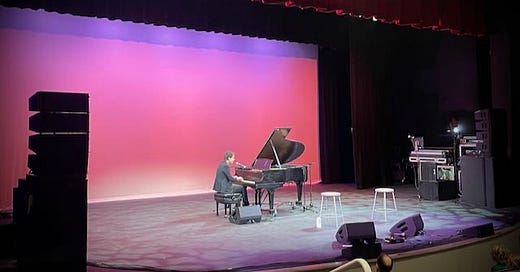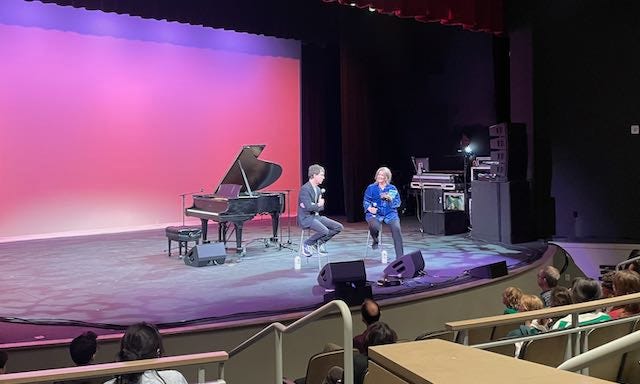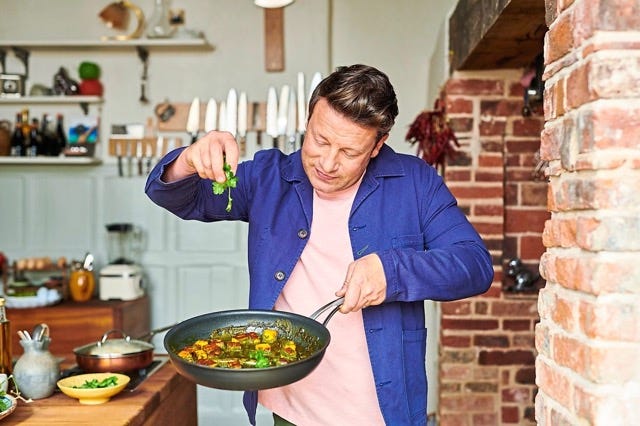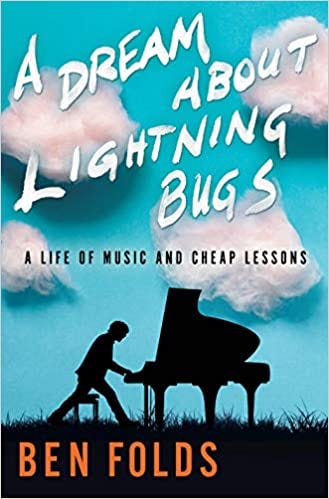Welcome to the Quarantine Creatives newsletter, a companion to my podcast of the same name, which explores creativity, art, and big ideas as we continue to live through this pandemic.
If you like what you’re reading, you can subscribe for free to have this newsletter delivered to your inbox on Wednesdays and Sundays:
Ben Folds Live
This past week, my family and I had the good fortune to attend a “masterclass” with musician, singer, and songwriter Ben Folds at the Umbrella Arts Center in Concord, MA. The event included a performance, a moderated discussion, and an audience Q&A and was targeted primarily to teen musicians.
My kids are on the younger side (they’re 9 and 6), but they have both shown musical inclinations lately and we thought it would be worth exposing them to some insights from an accomplished musician like Ben. They were very intrigued with the whole event, although they did get fidgety at one point and decided to start randomly dancing during the lecture portion. Ben called them out for it and seemed charmed by their youthful energy.
I really enjoyed getting to hear his take on songwriting, art, and creativity. I thought I would devote today’s newsletter to some of the lessons that I learned from the event with the hope that it will inspire you in your own creative ventures, whether that’s songwriting, prose writing, painting, photography, woodworking, growing food, or cooking a killer meal. As you’ll see below, artists of all kinds can inspire each other, even if they have a very different mode of expression.
Make a Mess
My 6 year old son was brave enough to ask a question during the Q&A portion. He wanted to know how Ben learned how to play the piano. That simple question sparked a broader conversation about how we learn to make art.
Ben recounted that his father was a contractor who renovated houses and would often bring home discarded items from a project. One day, his pickup truck arrived at the house with a piano loaded in it that had been left inside a house where he was working.
Ben had been listening to records all day since about the age of two and was so excited to start playing that piano. He spent the night when the piano arrived lying in bed imaging what songs he would play the next morning. He understood from listening to music that there were lower notes and higher notes and he thought if he could just find the correct keys, he could replicate what he heard on the radio.
When he awoke and approached the piano though, it sounded awful. He banged on the keys and it just made noise.
Still, he encouraged my son to do the same. In Ben’s mind, you have to start making noise to find music. At first, you’ll start to notice subtle differences in the sounds the keys make- the left side makes lower notes and the right side makes higher notes. He walked over to the piano to demonstrate.
As he played five or six keys at once, he then began to single out an individual note until he found one he liked. He then began playing adjacent keys until he found another sound that paired nicely with the first. Suddenly, he was making music.
Ben compared this to when a child is first learning to eat and they are encouraged to play with their food in their high chair. At first, it seems like a big mess, but within a few weeks, they are eating solid foods. What appears to be a mess to adults is really a child getting to know their food and understand the textures, the smells, and the feeling of food.
This notion of getting dirty to learn reminds me of advice I’ve heard from experts in other fields. I remember in particular being drawn to this style of instruction on Jamie Oliver’s cooking shows. While other TV chefs often focused on precise measurements or specific ingredients, Oliver always encouraged improvisation. If one ingredient was missing, he offered three substitutes. If he was using specialty equipment, he always explained a more common alternative.
The goal was to not get too stuck in the details, which might intimidate somebody from actually finishing a recipe. Instead, it was about inspiring self confidence, knowing that once somebody can cook one meal, they can aspire to more and better meals. He also taught technique that could apply to lots of different recipes.
If you don’t embrace the messiness of learning, you can never hope to approach the beauty of mastery.
Songs in 3 Acts
In discussing his writing style, Ben noted that songs often follow a familiar structure, with two verses, three choruses, and a bridge. Even though the choruses are repetitive, Ben tends to think of them in a 3 act structure like a playwright would for a drama.
Ben said he tries to sing each chorus differently, with the idea that the protagonist is growing and changing throughout the song. He made the analogy that it’s like having a person say the same phrase at 17 years old, at 30 years old, and at 50 years old. Even though the words may be identical, the meaning behind them is completely different because of who that person is at each age and the life experiences he’s had at those stages.
In his mind, the bridge of a song is not just a functional piece of the music, but it is in fact a narrative bridge for the hero of the song from who he is at the beginning of the story and who he is at the end of the piece.
I had never considered a song’s internal narrative before, but since all good stories have a beginning, a middle, and an end, it makes sense that songs that resonate might also follow that structure.
Liberal Artists
The last point was an observation about Ben Folds as a person. He struck me as very smart, well read, and well rounded.
Instead of only speaking about musical influences from his genre or time period, he was discussing music and art in a much broader sense. He described being influenced by Scott Joplin music on the piano, being a student of Leonard Bernstein’s Norton Lectures at Harvard, reading Noam Chomsky, and citing the brilliance of Kanye West as a lyricist (while also denouncing his behavior).
It was clear that Ben was a student of art, while also being a practitioner.
This balance between the liberal and the practical is something that Wendell Berry writes about at length in The Unsettling of America (a book I’ve cited in this newsletter many times, starting here).
To Berry, many educations focus either too much on being practical without understanding why things are done, or being too liberal. In the latter, classical literature might be studied, but there’s no practical application for that knowledge.
I’ve encountered many people in my life that only study within their industry. A filmmaker doesn’t see what lessons they can learn from a musician or vice versa. Ben seems to take a more global view, understanding that good writing can be inspired by anything and that it’s important to take in a varied diet of art. This thought leads nicely to Ben’s most important point.
Write Your Truth
Ben recently wrote a memoir and was asked to explain the title A Dream About Lightning Bugs. He described a dream he had as a young boy where he was leading other children around at dusk, pointing out lightning bugs that only he could see. The kids followed him and pretended to see what he did, but they were also looking at their own realities- one was looking at the stars in the sky, another at the trees.
Ben vividly remembers this dream, but he sees that dream as analogous to the writing process. Our understanding of the world comes from what we observe and what we value. To young Ben, it was the lightning bugs, even though nobody else could see them. He appreciated their luminesce and wanted to place them in a jar so he could share that light with others.
Our most authentic writing comes from what we can see and what we appreciate. When we write to those truths, and not to what we think somebody expects of us, we are being the most truthful.
I think it’s important to also consider that even if we are all looking at the same thing, we all see different aspects of it because of our life experience. If we feel strongly and passionately about how we see the world, we should write that and share it, like Ben sharing a jar of lightning bugs.
It was a good reminder to be authentic and to lean in to what makes each of our voices unique. I know that my kids may not remember every lesson that they heard from Ben Folds the other night, but I hope that watching him play with such passion or listening to his thoughts will stick with them as they develop their own voice in this world.
Related Reading
Wednesday Walk: Where Art Blooms
If you’d like to catch up on past episodes of the Quarantine Creatives podcast, they can be found on Apple Podcasts, Spotify, or wherever you listen.
Please consider sharing this with a friend that you think might enjoy it, or better yet, share it on social media so you can tell hundreds of friends!
If you’ve missed past issues of this newsletter, they are available to read here.
Stay Safe!
Heath









I've long been an admirer of Ben Folds' work, and I applaud him for holding these masterclasses; clearly, it was well worth the price of admission! While there are a ton of good takeaways here that I've taken note of, the two that truly stand out to me is embracing "the messiness of learning" and balancing the "liberal and the practical." These are concepts that I figured out a long time ago myself, and for many years, people kept telling me to choose a niche and pigeon hole myself.
But, nope, I defied both my elders and my educators and chose to just learn all that I could about anything that I could, but with one important distinction, that the knowledge I gained could be used practically. Now 35, I find that all the "useless trivia" and "extraneous knowledge" that people claimed I was overloading my head with has helped me immensely in working through problems most people can't even begin to tackle.
The trouble with our liberal educations today is that they simply aren't rooted enough in practical applications, and practical educations are too focused on having ONE JOB. The more I read business people citing they prefer specialists over generalists, the more I want to take a rubber chicken and smack them with it. The fact of reality is that, sure, we can’t all know everything we need to, and this is why we have to turn to experts in other fields.
There’s nothing wrong with having specialties, BUT, today, people dedicate their entire lives to doing ONE THING, and that means no one can figure out basic things like personal finance, household maintenance, or other practical necessities of life without a YouTube video or TikTok content creator showing them how to do so, and then, it’s mostly monkey-see monkey-do.
But, I digress. This clearly was a great experience not just for you, but your kids as well. I'm thrilled to see their interest in music and sure, they may not fully understand the points than Ben said tonight right now, but exposing kids to the liberal arts while also being able to take practical life lessons from these experiences is the only way I feel any human being can truly be complete. :)
I'm a victim of intellectual property theft by a global crime ring using national-security-breach level constant and relentless identity obliteration to continue to steal work and no one can, or will, stop them. At the dawn of the cyber age, artists are in mortal danger. Please lobby to have my case thoroughly studied!